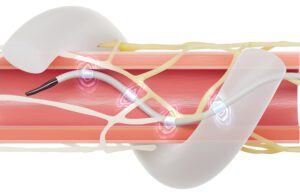
Medtronic is planning its first commercial renal denervation (RDN) cases and is already running a postmarket study after winning FDA approval of its Symplicity Spyral system for hypertension.
In an interview before the Thanksgiving break, Medtronic SVP Jason Weidman — who’s also president of the company’s coronary and RDN business — said he expects the first commercial cases to be performed this week.
“We’ve got a full team out there that’s ready to go,” Weidman said. “We’ll be leveraging our coronary sales force, which obviously has close relationships and familiarity with the physicians that do these procedures and they’re well-versed on renal denervation.”
Medtronic also has a field market development team to help centers set up hypertension clinics and get everything in place, he said.
“We’re going to focus on safe growth of this procedure [to] make sure that we get the right patients treated and treated correctly with the right procedure and in the right technique,” Weidman said. “… I’m confident that this is really going to help a lot of patients in need.”
Competitor Recor Medical started commercial cases with its Paradise ultrasound RDN system the day after winning premarket approval (PMA) from the FDA.
Medical Design & Outsourcing: How Recor Medical won the renal denervation race for FDA approval
The FDA approved Medtronic’s system the next week, but Weidman said “that week makes absolutely zero difference” from a competitive standpoint. And he said he believes the FDA would have approved Medtronic’s RDN system even without Recor’s approval before it.

“The FDA’s mandate is to review and approve devices on the merit of what those devices bring and what’s in their approval package individually. They don’t approve things as a class and they’re not supposed to be looking across different devices when making a decision,” Weidner said. “I absolutely believe that we would get approval whether it was us and Recor, or just us, or us and 5,000 other competitors. … We have a great amount of data and great data across 4,000 patients — 2,000 patients in the long run — we provide clinically meaningful drops that are sustained over time, and that’s great for patients and the FDA sees that.”
Medtronic RDN system manufacturing and postmarket study
Medtronic plans to manufacture its Symplicity Spyral RDN catheter in Galway, Ireland, Weidman said.
Medtronic has a contract manufacturer in Asia to make the Symplicity G3 generator, he said, but he did not want that partner identified.
Medtronic will continue to track patients through its AFFIRM study of approximately 1,300 real-world patients with uncontrolled hypertension. That postmarket study will look at at office systolic blood pressure at six months as the primary endpoint.
Medtronic has been talking with the FDA for more than a year about the postmarket study and worked through the IDE process to get early approval, Weidman said. The study is underway with patients enrolled and centers up and going, he said.
“It’s a single-arm study, but rigorously tracked and followed. We’ll be following that out to three years,” Weidman said.
Read more from this interview at Medical Design & Outsourcing, including lessons learned on Medtronic’s long road to approval and Weidman’s advice for device developers on device design, clinical trials and regulatory hurdles.